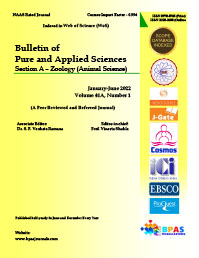Nutritional Aspect of Type-2 Diabetes Mellitus
DOI:
https://doi.org/10.48165/Keywords:
Diabetes mellitus, Nutrition, DietAbstract
Background: India is diabetes capital with home to 69.1 million people with DM, the second highest number of cases after china. 425 million people worldwide, or 8.8% of adults 20-79 years, are estimated to have diabetes. Urgent solution for reducing the predominance of this illness will require particularly the modifiable components including physical action, weight and diet. The role of nutrition for the management and prevention of diabetes is significant. The person suffering from type 2 diabetes are suggested by reasonable drug however dietary rules are frequently ignored and they give least unassuming consideration regarding diet while dietary guidelines are very important to achieve glycemic control. Aims and Objectives: Give dietary guidelines to people who are suffering from type 2 diabetes mellitus. Database and Methodology: In this retrospective study dietary guidelines for diabetic patients are summarized as given by Indian Institute of nutrition and WHO. Help is also taken from various websites and journals to collect relevant information. The study covers the original article of recent seven years i.e. from 2011 to 2017. Conclusion: Variety of different food patterns related to diabetes risk. High consumption of minimally processed plant based foods; consumption of monounsaturated fat; low- to moderate consumption of dairy products, fish, and poultry; low consumption of red meat; and low-to- moderate consumption of wine with meals have been associated with lower incident of type 2 diabetes.
Downloads
References
World Health Organization, Fact sheet updated, November 2017.
Ahmed AM, History of diabetes mellitus; Saudi Med J; 2002 Apr; 23(4):373-8. 3. “Diabetes fact sheet n0312”; WHO
Projection of global mortality and burden of disease from 2002 to 2030. Mathers CD, Lancer D. PLos Med, 2006, 3(11): e 442.
Ley SH, Hamdy O, Mohan V, Hu FB. Prevention and management of type 2 diabetes: dietary components and nutritional strategies. Lancet. 2014; 383(9933):1999–2007. Doi: 10.1016/S0140- 6736(14)60613-9.
International Journal of Endocrinology, Volume 2018, Article ID 9317987, pages, https://doi.org/10.1155/2018/9317987
Misra A, Sharma R, Gulati S,. National Dietary Guidelines Consensus Group. Consensus dietary guidelines for healthy living and prevention of obesity, the metabolic syndrome, diabetes, and related disorders in Asian Indians. Diabetes Technology Ther 2011; 13: 683-94. 10.1089/dia.2010.0198 21488798
Tay J, Luscombe-Marsh ND, Thompson CH,. Comparison of low- and high-carbohydrate diets for type 2 diabetes management: a randomized trial. Am. J. Clin. Nutr. 2015; 102: 780-90. 10.3945/ajcn.115.112581 26224300
Obesity management for the treatment of type 2 diabetes; American Diabetes Association; Diabetes Care 2016 Jan; 39 (Supplement 1): S47-S51. https://doi.org/10.2337/dc16-S009 10. Institute of Medicine of the National Academies: Dietary Reference Intakes for Energy, Carbohydrate, Fiber, Fat, Fatty Acids, Cholesterol, Protein, and Amino Acids (Macronutrients). Washington, DC, National Academy Press, 2002
Pi-Sunyer FX: Glycemic index and disease. Am J Clin Nutr 76:290S–298S, 2002 12. Mann JI, De Leeuw I, Hermansen K; Diabetes and Nutrition Study Group (DNSG) of the European Association. Evidence-based nutritional approaches to the treatment and prevention of diabetes mellitus. Nutr Metab Cardiovasc Dis 2004;14: 373–394
Bonsu NK, Johnson CS, McLeod KM. Can dietary fructans lower serum glucose? J Diabetes 2011; 3: 58–66
U.S. Department of Health and Human Services and U.S. Department of Agriculture. Dietary Guidelines for Americans, 2010. www.health.gov/dietaryguidelines.
Pan A, Sun Q, Bernstein AM. Red meat consumption and risk of type 2 diabetes: 3 cohorts of US adults and an updated meta-analysis. Am J Clin Nutr. 2011; 94(4):1088–1096. doi:10.3945/ajcn.111.018978
Jing Guo, D Ian Givens, Arne Astrup, Stephan J L Bakker, Gijs H Goossens, Mario Kratz, André Marette, Hanno Pijl, Sabita S Soedamah‐Muthu, The Impact of Dairy Products in the Development of Type 2 Diabetes: Where Does the Evidence Stand in 2019?, Advances in Nutrition, Volume 10, Issue 6, November 2019, Pages 1066–1075.
Hirahatake KM, Slavin JL, Maki KC, Adams SH. Associations between dairy foods, diabetes, and metabolic health: potential mechanisms and future directions. Metab Clin Exp. 2014; 63:618–27.
Givens DI Saturated fats, dairy foods and health: a curious paradox Nutr Bull 2017; 42:274-82.
